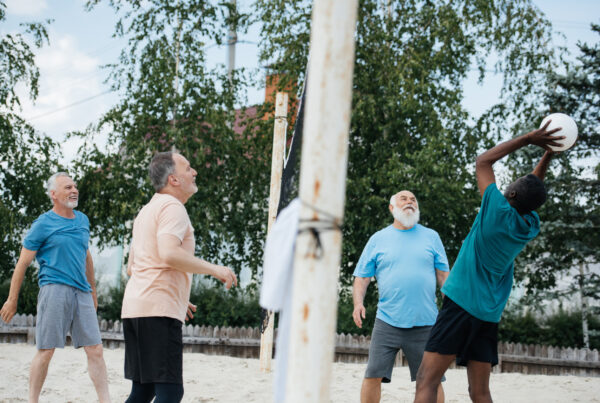”Question: How does exercise play a role in my stress management?
Reading time: 6 Minutes
MWi Hack:
- Learn how exercise can help you manage and even decrease stress levels
MWi Summary:
- Exercise reduces the negative effects of stress by reducing fatigue, improving alertness, enhancing concentration, and improving cognitive function.
- Exercise can decrease cortisol levels, which is a hormone that stores up with long periods of stress.
- It’s important to choose physical activities you find enjoyable to maximize stress reduction.
Regular exercise can help tone your internal systems to reduce and better manage your stress.
When you find yourself in a stressful situation, you might notice a quicker heart rate, a sense of panic rising, and your brain might shift toward crisis mode.
Stressors can pop up from just about anywhere. It doesn’t matter whether you’re responding to an actual threat, like a car speeding toward you, or to an anticipated threat, like your partner sitting you down to say, “I think we have to talk.” Stress is unique to you and how you perceive the world.
Stress can be a helpful tool for motivating us out of scary situations. But if it continues for extended periods or you have trouble calming down, it can affect your mental and physical health.
What helps one person manage stress might not work for everyone. But many people find that regular exercise helps them stay on top of stress. If you are open to exploring different types of exercise, you just might find relief.
How does exercise reduce stress?
Prolonged stress can take a toll on your body and brain, adversely affecting your sleep, mood, and relationships.
It may not be possible to completely get rid of stress, but it’s possible to prepare your body to respond safely to stressors, and exercise can help.
According to the Anxiety and Depression Association of America (ADAA), physical activity can interrupt the negative effects of stress by:
- reducing fatigue
- improving alertness
- enhancing concentration
- improving your ability to think and reason (cognitive function)
An improved ability to start alert and think clearly can be very useful when feeling stressed — a state that often involves reduced energy and difficulty concentrating.
Also, a 2020 review of studies tracking the effects of exercise on depression and anxiety levels brought on by the stress of the COVID-19 pandemic found that exercise helped reduce anxiety and lowered stress levels. Exercise may help the brain better manage stress and regulate the systems that trigger anxiety.
Effects of exercise on the brain
According to The American Psychological Association (APA), physical activity can also elevate your brain health by improving your mood, cognition, and overall memory.
These things play a role in how you perceive or experience stress. When your brain performs well, it can better evaluate and respond to stressors.
When your body perceives a threat, it rallies to protect itself through the fight, flight or freeze response. When this response is triggered, your body will experience:
- blood pressure increases
- rising heart rate
- body sweats
- a surge of energy
- a sharpening of your senses
These natural responses help prepare you for any upcoming and stressful challenges you might face, such as taking a test or swerving to avoid a car accident. But when you experience prolonged stress, this response can become less effective over time.
This is because your body helps you deal with stress by producing cortisol. Created in the adrenal glands, cortisol is a hormone that quickens your heart and gives you a boost of energy. But for a long-term crisis, such as extended unemployment, caring for a sick child, or experiencing post-traumatic stress, your body may produce too much cortisol.
High cortisol levels over extended periods can cause physical health issues such as Cushing’s syndrome and suppression of your immune system, making you more vulnerable to colds and sickness. High cortisol levels are also linked to an increased risk for depression.
Regular exercise, a form of positive stress, can reduce stress hormones like cortisol, which can shore up your immunity and help your brain feel less stressed or under threat.
Stress management through physical activity
For many people, an exercise routine builds self-esteem. You may find satisfaction from going to the gym or developing creative ways to exercise indoors.
Feeling good about how you handle exercise may make it easier to take other precautions against stress, including sleeping well or taking breaks from work.
A 2021 meta-analysis found evidence that exercise improves someone’s perceived sleep quality and lessens insomnia severity in adults. Also, a 2020 review concluded that strength training helps with the pain of tension-type headaches, and aerobic training helps reduce the severity of migraine headaches.
Overall, exercise might help reduce the severity of several triggers for stress, including poor sleep and headaches. Exercise may even curb your symptoms of stress and make you more likely to handle new stress better.
Which exercise is best for stress?
The best exercise for stress is the one you’re most likely to do. Do groups light you up? If yes, perhaps a gym class or running club is right for you.
If you find yourself easily turned off by competition or social banter, you may find walking alone or a solo aerobics routine is more your style.
Here are some physical fitness activities that may relieve your stress.
Indoor activities
The Center for Disease Control (CDC) suggests that indoor physical activities can be more than traditional exercises like running or weightlifting.
Alternative physical activities can include:
- family games that involve moving, such as family dance-offs
- cleaning your house or doing yard work
- planking or jumping rope during television commercials
Running or aerobics
Intense exercises like running or aerobics can do a lot to reduce stress and anxiety. Some of the benefits of running and aerobics include:
- improved mood and increased endorphin levels
- more restful sleep
- lower levels of cortisol
- potential for increased self-esteem
Yoga and strength training
Yoga and strength training can calm your stress by providing a “time-out” from stressful situations. You can even try specific types of yoga and mindfulness that you can practice right from your chair at work. A 15-minute session practiced before and after a tough meeting might help lower your anxiety and make you feel better.
The U.S. Department of Health and Human Services recommends 75 minutes of acute or 150 minutes of moderate physical activity a week to see substantial benefits to your health.
Even minutes after acute exercise, according to a 2017 review, cognitive/behavioral effects manifest. These include:
- better executive functioning, including better focus
- improved long-term memory
- improved mood and attention
That said, for some people, acute physical exercise that gets your heart rate up may cause your body to react in a way that feels like a panic attack. If you experience this, you may wish to exercise at a more moderate rate.
It helps develop an exercise routine with an intensity level that fits your lifestyle and fitness level. You might want to also consider what exercise level will be more likely to keep you coming back and not turn you off that routine entirely.
Let’s recap
A survey of U.S. adults in early 2021 found that over 80% of respondents reported feeling at least one emotion associated with long-term stress.
If you have been feeling especially stressed over the past few months, you aren’t alone. But you may find some relief in implementing a new exercise routine.
Exercise can reduce stress and train your brain to respond to new stress with fewer repercussions. Exercise can also improve aspects of your physical health, such as a stronger immune system and improved quality of sleep.
Stress may be inevitable, but an exercise routine can help you handle it.






